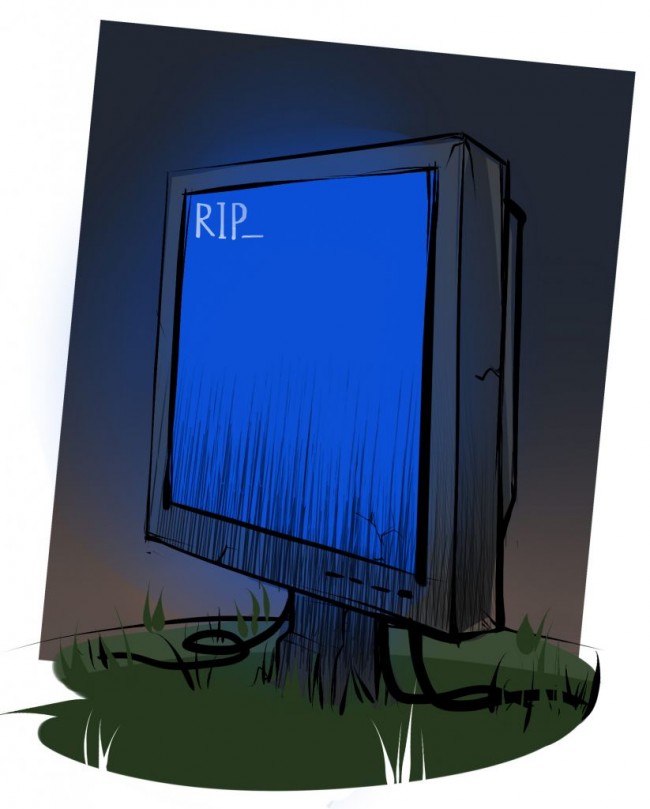Two weeks ago, I received a rather typical notification from Facebook. “One of your friends has a birthday this week,” prompted the note. “Wish her a happy birthday.”
To a vast number Facebook users, this notification is oftentimes annoying, yet surely innocent in its intentions. But one thing Facebook failed to take into account was that this particular friend of mine had committed suicide two years prior. What ensued was even more disturbing. Two years after her death, my friend’s profile page was full of updated links, holiday wishes, and I-miss-yous. Her social activity had continued as though she were still the person behind the screen—she even added new friends and changed her profile picture. Although all of this was done with good intentions by family and friends in an attempt to remember her, I could not help but wonder: What would she think if she saw this? Was this really what she wanted? For me, this desperate social perpetuation of the deceased is no longer authentic. It strips these individuals—who can no longer defend themselves—of their right to death and peace online. As death is the literal end of a person’s life, updating that individual’s social media post-mortem is inauthentic and disrespectful. Facebook must do more to guard against this.
Currently, the social media behemoth has over one billion users. Due to Facebook’s popularity, three out of five people who die will own active accounts. As of December 2014, over 4,329 Facebook users die each day.
Interestingly, death on Facebook was not always this prevalent. Founded in 2004, the site’s demographic initially consisted only of young college students; death here was rare. As Facebook grew in popularity, more people over the age of 65 began registering compared to any other age group. Now that the overall age of Facebook users is growing older, the problem of deceased Facebook users has, and will, continue to increase.
To remedy the social presence of the deceased, Facebook’s policies allow for users’ accounts to be reported and memorialized. To do this, a user must report the deceased’s name, approximated date of death, and proof, such as a death certificate or obituary. Once memorialized, no one can login or make changes to the profile; the account’s content as it existed before the death will remain as is, along with the privacy settings; other users will not receive birthday reminders or invitations to connect; new friend requests will no longer be accepted, but existing Facebook friends of the user can still share memories in a memorialized timeline. These innovations are all part of an attempt to honour a person’s memories respectfully on Facebook; but, while thoughtful, this strategy is too naïve.
Already, many users have been kicked out of their accounts when obituaries with identical names were submitted as proof of death. Simon Thulbourn, a German software engineer and famous victim of this phenomenon, discovered that there was, ironically, no way to submit proof of his ‘aliveness.’ Only after taking his frustration onto Twitter and going viral, did this prompt an apology from Facebook, and his account’s reactivation.
Also, once the Facebook account is memorialized, new friends cannot be added. In cases where the deceased is not yet Facebook friends with family members, the latter will be locked out from the memorialized timeline, which defeats the purpose.
To top it off, proof of death is not always easy to come by. Without an obituary, only the immediate family of the Facebook user may have access to hard proof of death. Memorializing the account is then up to the family’s discretion and technological know-how.
Facebook’s policies on memorializing users is deficient. A better procedure should be available—one that integrates automation to aid active reports. Phrase recognition algorithms detecting posts with phrases such as “RIP” can be considered. Accounts lacking a set number of posts from the user per year should be flagged for review automatically. But perhaps most importantly, a deceased person’s accounts should be memorialized in a way where no future posts by others is possible. Unlike a physical funeral, an online memorial of continuous messages defies the timespan of death. On Facebook, posts by friends and family stretching out over years after death make it seem as if a loved one is still forever suspended in a state of dying. By eliminating this, social media can preserve an authentic representation of a person’s life, and allow for a peaceful end on Facebook.
Death is a physical inevitability, and we should give it the same closure on social media that it has in real life. In the case of my friend’s suicide, this right to die must not be outweighed by our need to remember on social media.









